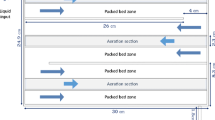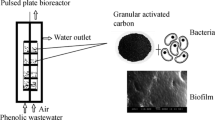Abstract.
Using a continuous enrichment technique, a bacterial consortium capable of degrading 4-chlorophenol (4-CP) was obtained from the rhizosphere of Phragmites australis. A granular activated carbon (GAC) biofilm reactor was established using this consortium, and the degradation of 4-CP was investigated under continuous flow operation using a feed of 20–50 mg l–1 with a hydraulic residence time of 17 min over a 6-month period. Chloride liberation occurred throughout the operation, and the reactor had 4-CP removal efficiencies of 69–100%. Periods of lower performance were attributed to clogging of the column with biomass and the formation of channels. Subsequently, the immobilized biofilm was subjected to a starvation period of 5 months, after which its degradative capacity was still maintained. The microbial consortium was characterized during the continuous flow experiment and dynamic population changes were observed throughout. One isolate recovered from the biofilm was shown to be capable of degrading 4-CP as a sole carbon and energy source.
Similar content being viewed by others
Author information
Authors and Affiliations
Additional information
Received revision: 11 July 2001
Electronic Publication
Rights and permissions
About this article
Cite this article
Carvalho, .M., Vasconcelos, .I., Bull, .A. et al. A GAC biofilm reactor for the continuous degradation of 4-chlorophenol: treatment efficiency and microbial analysis. Appl Microbiol Biotechnol 57, 419–426 (2001). https://doi.org/10.1007/s002530100794
Received:
Accepted:
Issue Date:
DOI: https://doi.org/10.1007/s002530100794




